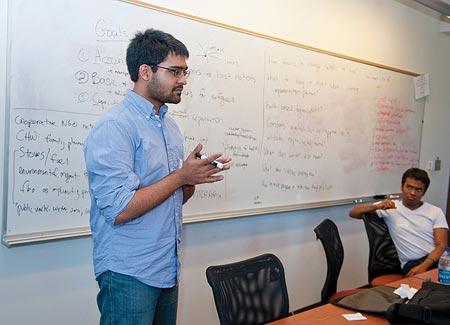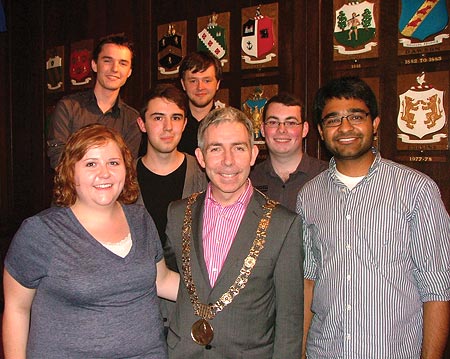When Mohit Agrawal, who was in Indianapolis for the final Rhodes Scholarship interviews, called his father Suresh Chand last week in West Lafayette, Indiana, he was breathless.
"At 5.30 in the evening he called and said, 'Guess what? I won it'," recalls his father. His immediate reaction was: "What?"
Mohit has been winning many scholarships and grants in the past few years, which have taken him to Singapore and Ghana. It must have taken his father a few minutes that he had come from Ireland for the Rhodes interview.
Mohit, a Princeton graduate with a major in mathematics and a certificate in computer science (plus courses in politics), is studying for a year in Ireland on another prestigious scholarship, the Mitchell, the Irish version of the Rhodes Scholarship.
In fact Mohit had turned down the final Rhodes interview previously and vied for the Mitchell because he thought studying in Ireland would be more exciting than being in the United Kingdom on a Rhodes Scholarship. But he also told himself over a year ago he would reconsider the Rhodes for the more ambitious doctorate programme.
Among those who called to congratulate him was the former Senator from Indiana, Richard Luger, his professors from Princeton, and a schoolteacher from West Lafayette.
Brian Fultz told a local newspaper that Mohit was a student 'thirsting for knowledge', and that kept Fultz on his toes in the classroom. "I had to up my game because he would question, not in a disrespectful way, but... he wanted to see how things connected to other things, was there a pattern," Fultz said. "He was a brilliant kid who could ace all our tests and do well on everything he was given. It was interesting to see him go from not only learning all this material, but learning what to do with it."
Soon after the winners were announced, Mohit flew back to Dublin and then to the National University of Ireland in Galway. He will follow a PhD programme at Oxford starting next September.
'I can say I feel like an economist for the first time'
Image: Mohit Agrawal (right) with Dublin, Ireland's Lord Mayor Andrew Montague (center)What has been the educational experience in Ireland like?
In Galway, I'm working with Professor Alan Ahearne to mathematically model the impact of Ireland's real estate taxes on its housing bubble -- could tax structure have prevented the boom, and thus the collapse?
The program in Ireland has really helped me transition from a very technical background in mathematics, operations research, and physics/biology into economics. I can say, I feel like an economist for the first time.
By studying in Ireland, I've been able to gain an intimate understanding of the Euro crisis that I'll bring to my studies in Oxford. More importantly, I've realised that the economics profession in Ireland is different than that in the United States/UK. There is less of a separation between academic economists, policy economists, and popular/journalist economists here.
Ahearne is both an academic economist and a policymaker, while Morgan Kelly in Dublin is an academic economist and a popular writer. One of the key themes of my Rhodes application was that my international experience would make it easier for me to bridge these gaps in economics.
You are deeply interest in politics...
At Princeton, I integrated my interests in politics and mathematics into a program of interdisciplinary study. In Ireland, I have found course requirements to be more rigid, but participation in the literary and debate society and on the editorial board of the student newspaper have opened up new avenues of academic exploration to me.
But politics is more than academic, it is a contact sport, and I got into my first real scuffle during an Engineers Without Borders project in Ashaiman, Ghana.
At Princeton, I had joined the EWB because of a high school interest in engineering and a vague desire to do good.
My involvement deepened, and I travelled to Ghana during my sophomore year at Princeton as project manager. I led a team of students in building a school library.
But once in the country, we met with resistance from the officials. Our project got back on track only after we reached out to local parents and politicians, allaying their fears, and welcoming their feedback.
'I've come to understand the vital role that mathematics plays in our national security'
Despite my interest in politics and policy, I'm just as likely to be found dissecting the latest non-proof of P=NP as to be engaged in pointed political midnight debates.
At Princeton, I learned how mathematics drives applications in economics, physics, biology, and computer science. I've learned more, though, as I pursued research projects outside the classroom.
In my senior thesis, I developed an algorithm to estimate the covariance between sparse data sets, with applications to gene expression research. Over the previous two summers, I've come to understand the vital role that mathematics plays in our national security, as I conducted research for the Department of Defense.
And during study abroad at the National University of Singapore, I studied fast algorithms for data interpolation using uniform B-splines, a class of functions important in engineering surfaces. But what really caught my eye was Singapore's ability to engineer economic growth -- over the past 20 years, per capita GDP has tripled and now matches that of the US. Ghana, on the other hand, has had near zero growth -- this, even over dozens of libraries, like EWB's, have been built.
The most important equation, then, that I learned while in Singapore had nothing to do with B-splines: The Singaporean government is ruthless in pushing through policy, while Ghana's weak democracy has faltered in implementing even the most basic of reforms.
Moreover, the Singaporean government works with mathematicians to model economic policies, while decisions in Ghana are made with far less study.
For instance, poor financial modelling during the Kufuor administration led to the sale of Ghana Telecom for hundreds of millions of dollars less than its later valuation by outside experts. I seek to combine my background in politics and mathematics to help create an economic policy, be it at the World Bank, or the US Treasury, or in Congress.
'I straddle the frontier between 'math' and 'non-math''
My first instinct was to respond with a light joke, but all that came to mind was, "Yes, sir, I'm prime."
Fearing the reaction of my 15 classmates and friends, I refrained from employing the corny rejoinder. But the alternative -- a straight answer -- was impossible.
Professor Bolten's question presupposed a binarism between "math" and "non-math" students, but I don't see it that way. With disparate interests in politics, policy, mathematics, and economics, I straddle the frontier between "math" and "non-math."
I've learned more about the complex political realities of Ireland by listening to and engaging in debates at the college bar than I ever could have by reading the papers. My biggest takeaways, though, are the daily reminders that economics cannot be wholly described by impersonal mathematical equations.
Economics has a human impact, as I've seen in my own program as some students struggle to make ends meet. And Michael D Higgins, Labour's candidate for president, has struck a chord in Ireland by decrying "scientific" economics and reminding voters that there are ethical implications of economic decisions." (Higgins has since won and been inaugurated).
A doctoral program will allow me the opportunity for deeper study, deeper research, and deeper reflection in an open academic atmosphere.
In search of doctoral programs, I instinctively looked to the United Kingdom because the characteristics I sought -- fast-paced teaching, practical training, and interdisciplinary coursework -- were largely missing from American programs. I found the ideal program at Oxford, where I would read for a DPhil in Financial Economics from the Said School of Business.
Excerpted from Mohit Agrawal's Rhodes Scholarship essay





Comment
article